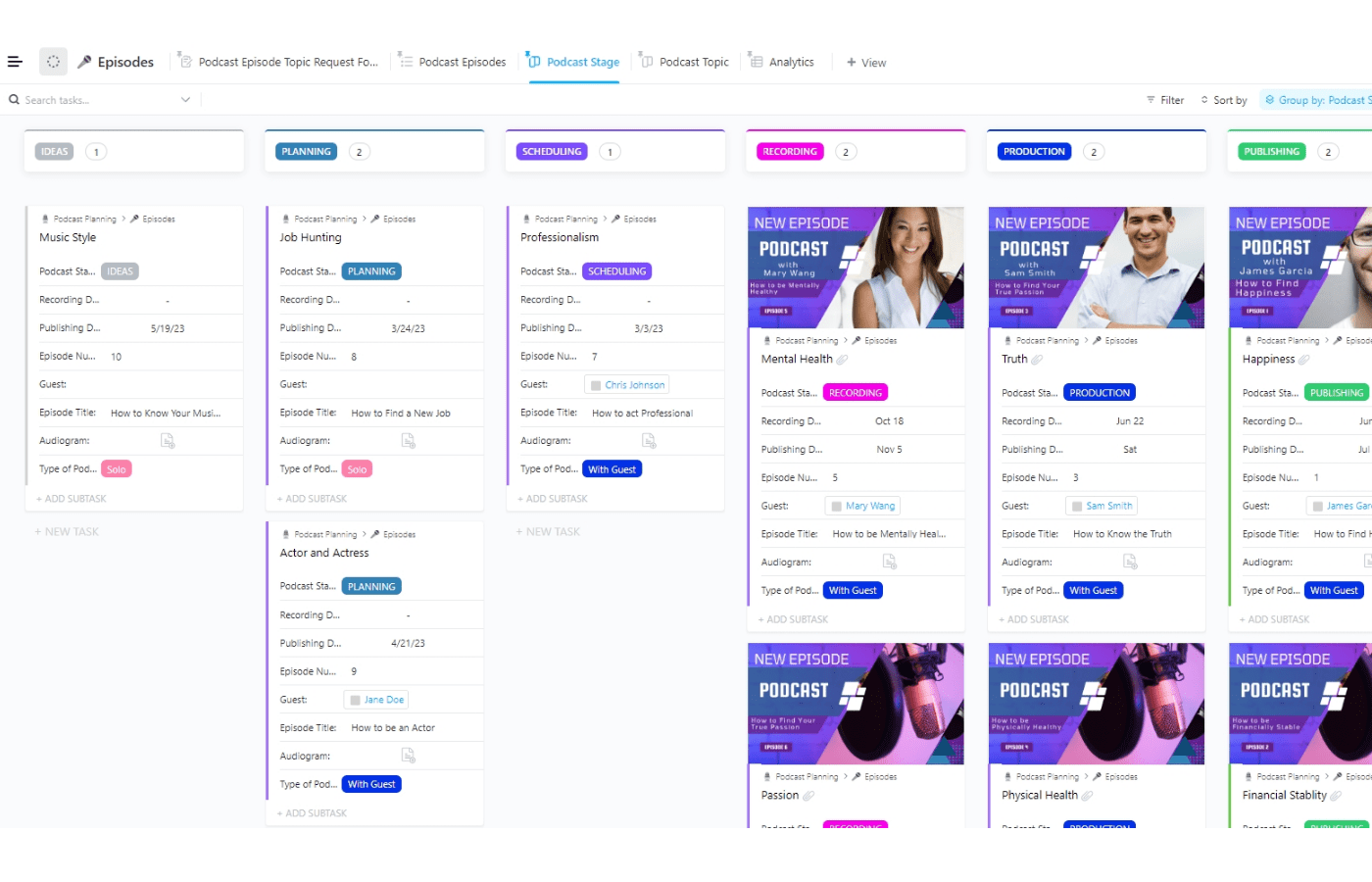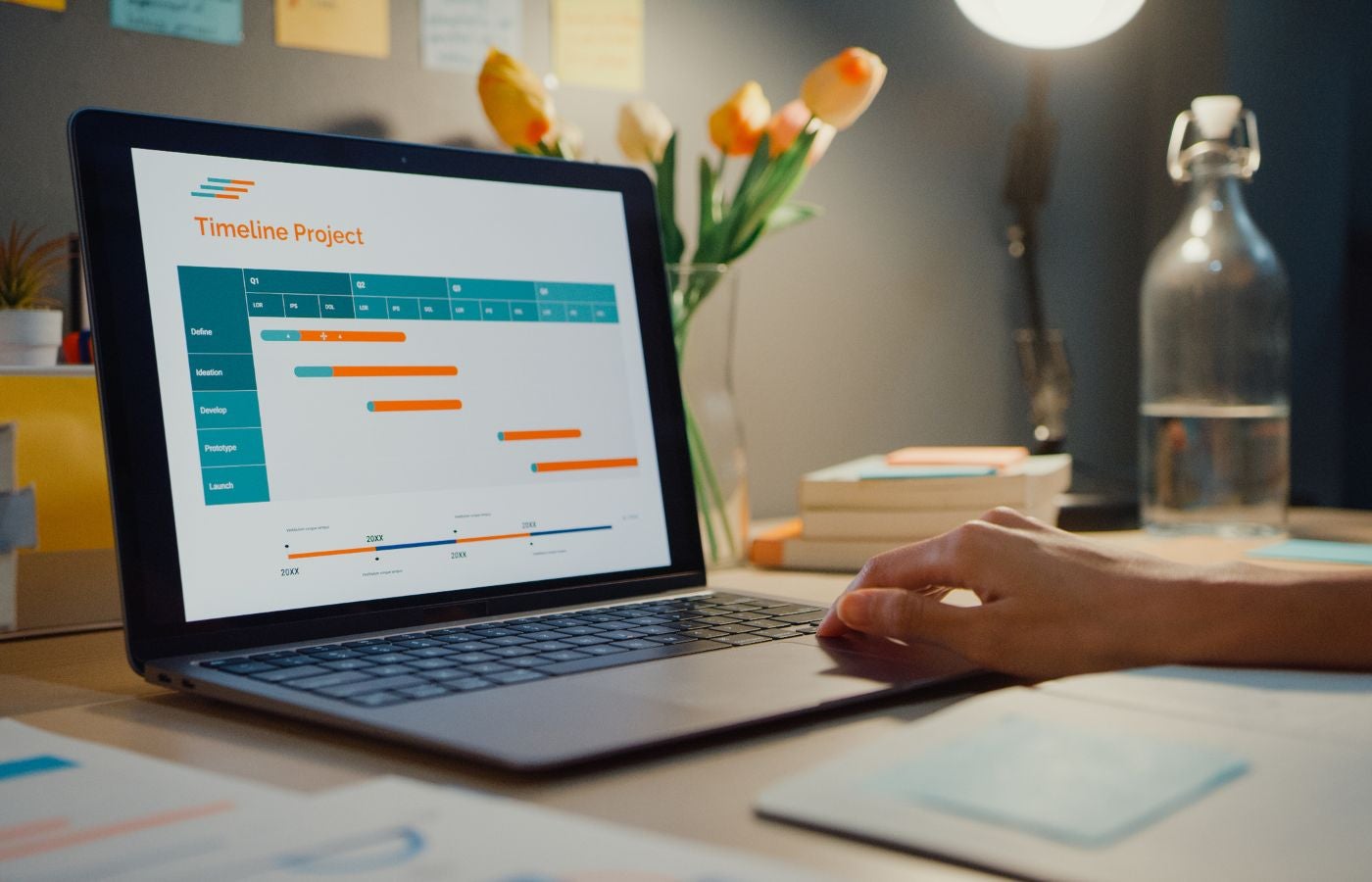If your team has been using Trello to manage agile projects, workflows, and tasks, you can now connect it to Notion. Integrating Notion and Trello lets users have access to the latest information no matter where it resides.
Native Trello Integration to Notion
All Notion plans include access to its integration gallery of more than 60 native connections to other tools. The Notion team developed many of these integrations themselves, such as its Trello integration. The integration syncs information between the two apps so users can view any update in a Trello card from within Notion. The Trello integration also lets users import Trello boards into Notion and quickly open specific boards and cards with quick links.
Integration Setup – Notion Integration Gallery
To add the Trello integration, go to the Notion Integration Gallery page and search for Trello. When the Trello box appears, select it to proceed with the integration.
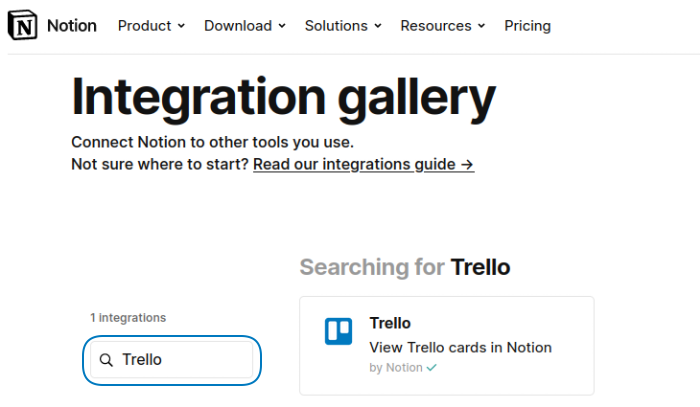
On the Trello integration page, additional information and instructions are available regarding the features and on how to connect the two apps. On the upper right side, click the “Add to Notion” button to continue.
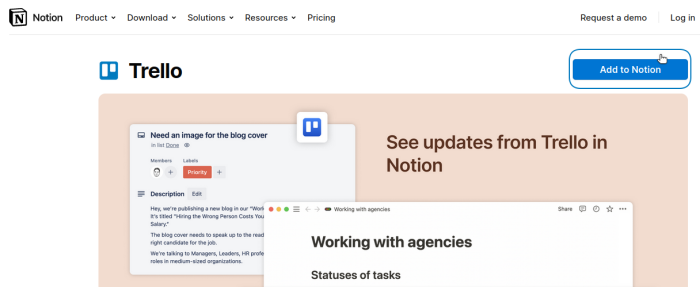
Users need to log in to their Trello or Atlassian accounts. After logging in, Notion will inform users of what it means to integrate the two applications. It enumerates what Notion will be able to do and what it is not able to do using the connection. To give Notion access to your Trello account, click Allow.
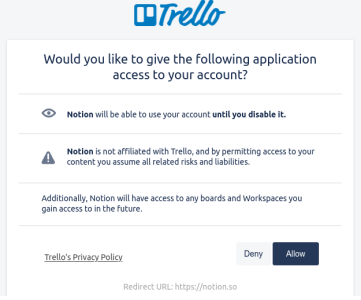
Integration Setup – Within Notion App
Adding the Trello integration from Notion’s integration page is one way to connect the two apps. Another is from the Notion app but the outcomes are the same: in that you’re giving Notion permission to access your Trello account.
From any Notion page, go to the left-side navigation menu and select “Settings & members.”
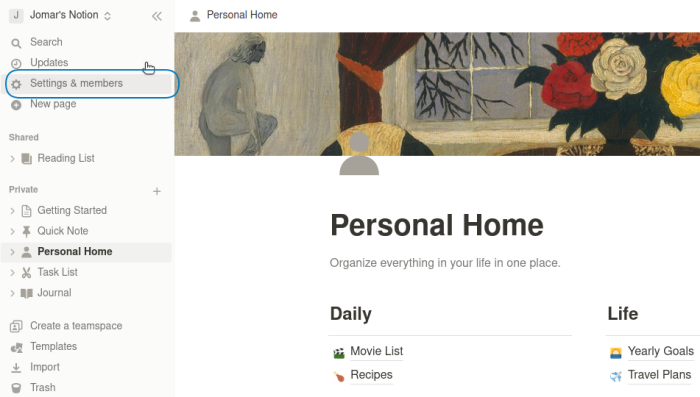
Select “My connections” from the side navigation to show the different ways to connect and manage connections with other apps. A few apps that Notion has integration with will appear.
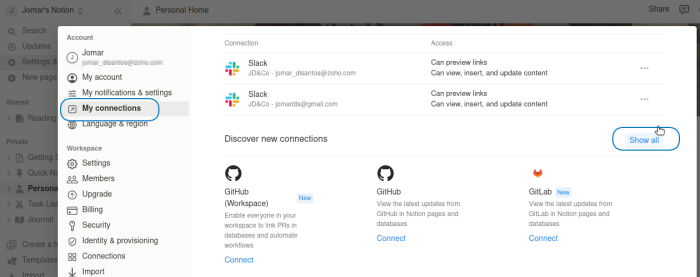
Click the “Show all” link to see the other app connections, including the one for Trello. Under Trello, click on the Connect link to proceed with the integration. You will be prompted to log into your Trello account, after which permission access will appear, as in Figure 03.
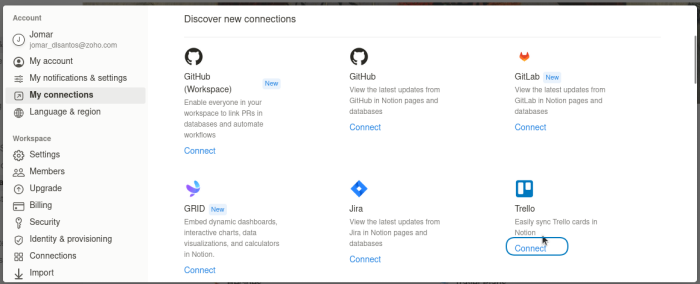
Trello Integration Features
The native Trello integration from Notion includes two features. One is the data import feature that lets users import Trello board and card data into a Notion database page. The other is a Trello link preview for a quick way to see the latest updates in Trello while working in Notion.
Data Import
Notion data import works on many apps including Trello. Specifically for Trello, it will migrate board and card information that a user selects to import into Notion. Information copied into Notion includes the different columns in the board, cards in each column, and other card details such as text descriptions, image covers, attached documents, and HTML links. In this example, we will import the Trello Reading List board into Notion.
To import data from Trello into Notion, from the Notion side navigation, select “Import” at the bottom of the side menu. A choice of apps will appear on the center pane. Click on the Trello box.
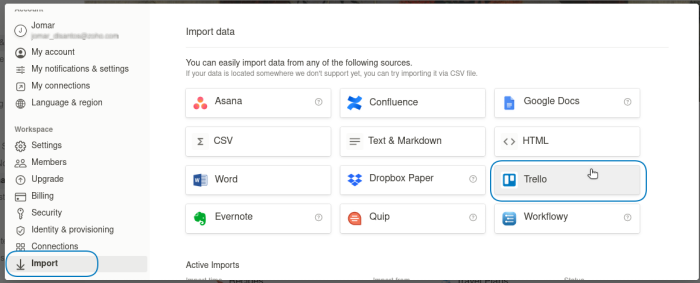
Notion will show a confirmation page that informs the user of what it means to allow Notion to access the user’s Trello account. To continue with the data import, click on Allow.
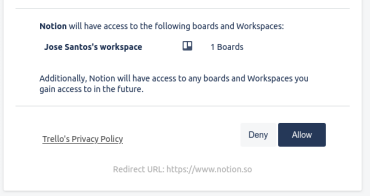
A popup window will let you choose which boards from your Trello account you wish to import. Select the right board and click on Import.
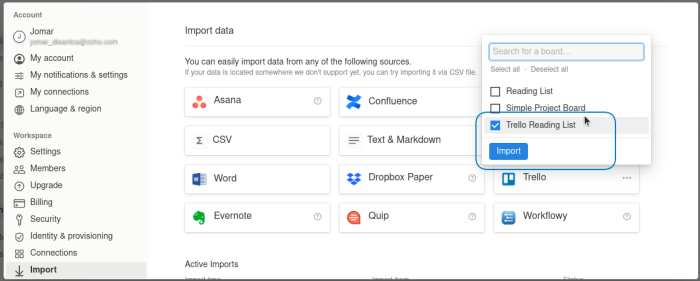
In this example, Notion will import the Trello Reading List board, which includes the columns Not Started, In Progress, and Done. Under each column is a card or several cards, some of which have an attached image appearing as a cover.
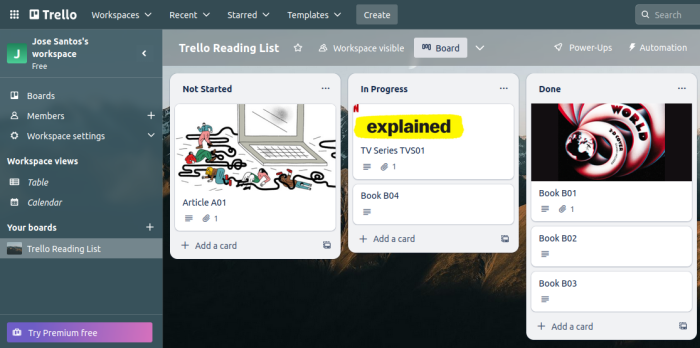
After the data import using the Trello integration, Notion created a new page called Trello Reading List. It was able to copy the different columns, cards, and card details. However, the positions of the columns are differently arranged, as well as the addition of a “No Status” column.
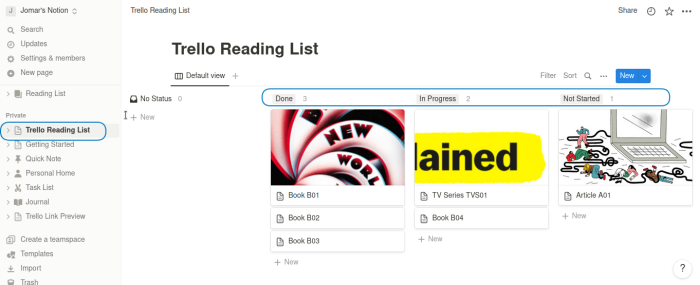
This can be easily rearranged using drag and drop. Also, card details, like the title and attachments, are successfully copied as seen in this side-by-side comparison.

Trello Link Preview
Another feature of the Trello integration with Notion is a link preview. By pasting a Trello link in Notion using “Paste as preview” option, Notion users are able to sync updates happening in Trello and seeing the effect of the updates in a Notion page.
In some cases, this feature is not as smoothly implemented as the data import feature. User feedback seems to indicate that pasting a board link is not possible, and only card links will show the correct result. Again, not all who attempted were successful even with the card links.
When a user copies a link to a Trello card and then goes to a Notion page to paste it, Notion gives the users several paste options. The “Paste as preview” supposedly will show the detailed preview of the linked content as well as any updates to it.

On a Notion page, you can also use the slash (/) shortcut and type /trello to see what actions are available.
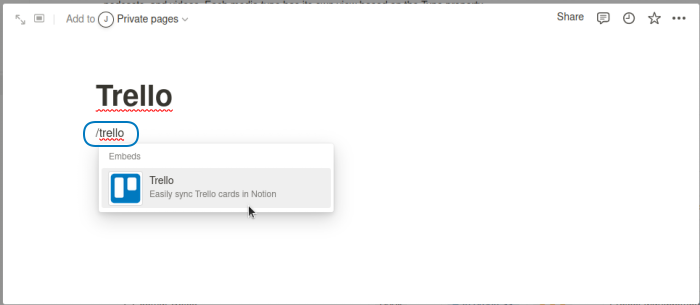
The Trello integration with Notion lets users embed a Trello card in a page by pasting the card’s link.
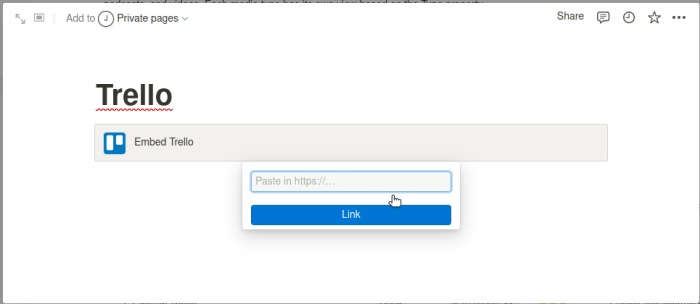
If it is your first time to connect the two apps using the integration, you will see a message of what the connection can do. Users who have access to the Notion page where the Trello card is embedded will see rich previews that update in real time.
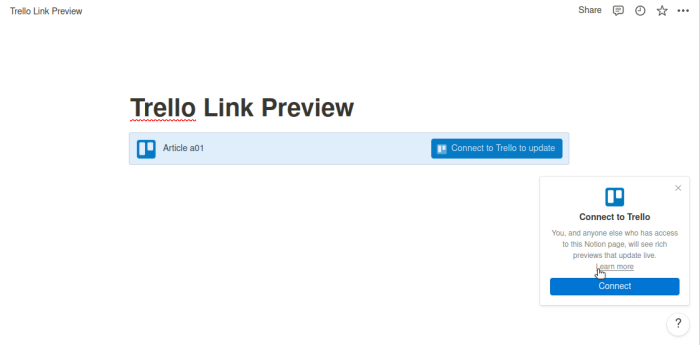
To continue with the integration, click “Connect.” You will have to log into your Trello account and give Notion permission to access certain data, as shown similarly in Figure 03 and in Figure 08.
Unfortunately, in some cases, “Paste as preview” does not work, and only “Paste as link” does. Also, clicking “Connect to Trello to update” may result in a “Session not found” message, even after giving Notion permission to access the Trello account.
Trello Power-Up
Another way to integrate Notion and Trello is through a Trello Power-Up. A Trello Power-Up enables users to integrate the tools they use with Trello. All Trello plans come with unlimited Power-Ups so users can connect multiple tools to unify their data and simplify their workflow.
Integrating Trello with Notion using a Power-Up is possible using the Notion + Trello 2-Way Sync by Unito.
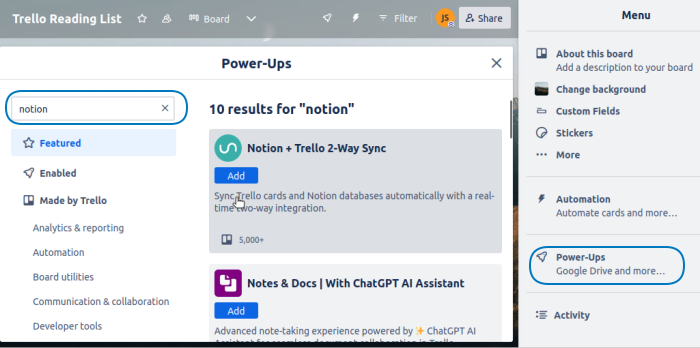
The 2-way sync integration allows updates in one app to appear in the other app. This means any update in a Trello card will reflect on the corresponding item in a Notion page in real time, and vice versa. However, this integration from Unito is not free.
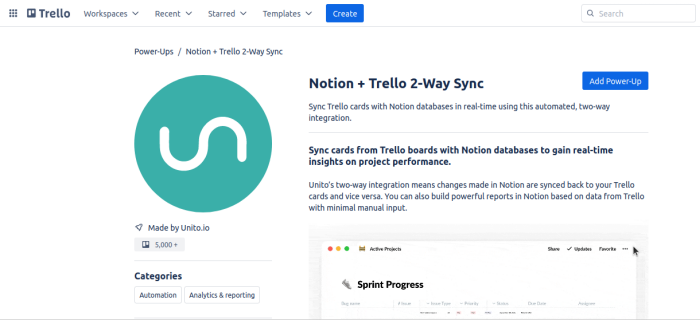
Other Third-party Integrations
Aside from the native Trello integration made by Notion and the premium Trello Power-Up, there are other integrations that enable the connection of Notion and Trello. Some of these integrations are available from Tray.io, Pipedream, Zapier, Plus, Appy Pie, and Make.
Benefits of Trello-Notion Integration
Teams use Trello for agile work and project management. Many organizations are now using Notion for a centralized collaborative workspace. Integrating Notion and Trello can bring increased productivity to its common users.
By taking advantage of the features and strengths of Trello and Notion, teams can realize greater benefits using these apps in combination. For instance, teams can use Trello’s visual boards to manage tasks while using Notion to contain extensive documentation, attachments, and conversations for each task in a Trello card.
Another application is when one team who uses Trello needs to collaborate with another team who uses Notion. The integration between the two apps ensure that both teams get the update they need without having to use and learn another platform.
Ready to do more with Notion and Trello integration?
Notion and Trello are productivity apps that promote collaboration. Both apps include integration with other tools that give users the opportunity to manage their workflows better and easier. It is also important to consider security and privacy concerns when performing integration. Make sure that users follow best practices to minimize any potential risks and challenges.


